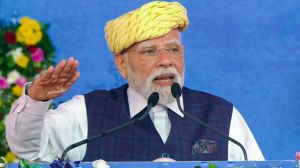Bharuch factory workers turn around fortunes
For Jasubhai Patel and his co-workers at Goodearth Synthetics Limited, a small yarn dyeing unit in Ankleshwar GIDC unit, this New Year will ...

For Jasubhai Patel and his co-workers at Goodearth Synthetics Limited, a small yarn dyeing unit in Ankleshwar GIDC unit, this New Year will be unlike any other. Having given their unit a new lease of life in just five years, Goodearth employees are now planning a small celebration on January 5 to mark the unit’s turnaround.
Located in the Ankleshwar GIDC industrial estate, Goodearth looks like just one of the many small industrial units. But run by the GIDC Employees’ Union, it is one of the rare success stories wherein a workers’ union intervened after a winding up petition was filed in the high court, took over the industrial unit, paid off all dues in five years and made a success story of its operations.
A synthetic dyeing yarn unit, Goodearth was sold off by its original owner Bhupendra Jariwala to Mumbai-based Ramesh Jain in 1995. But Jain also took huge loans against this unit. With him turning absconder, it was one such creditor, Ajmer-based Mittal Capitals (India) Limited, which filed a winding up petition in Gujarat High Court to recover its dues.
Ankleshwar GIDC Employees Union, named as one of the respondents in the petition, decided to appeal against the move. ‘‘At stake was the livelihood of 35 families and though the unit was not performing very well, it was not a loss-making proposition either,’’ explained union president D.C. Solanki. It was this confidence that paid off, with all the right legal help as well.
In October 1998, the high court appointed Solanki as the sole receiver of Goodearth Synthetics Ltd and allowed the workers to run operations. The workers had to submit quarterly record of accounts. ‘‘The case is unique though the workers were only allowed to operate with the case in pendancy. But they worked diligently to sustain the unit,’’ said A.K. Clerk, the union’s advocate.
Some initial help from their former boss B. Jariwala and the workers’ willingness to forego their allowances and benefits helped tide over the tough times. ‘‘Jariwala got us the initial orders and other companies followed suit, and in tough times, we all collectively decided to forego the financial benefits,’’ said Mohanbhai Patel, one of the six ITI trained worker in the unit who also doubles as the manager.
The first decision of the workers was to introduce uniforms. ‘‘We wanted to feel respected and also united, so in addition to payment of salaries as per the minimum wage act, this was the first thing that we decided to go for,’’ remembers Jasubhai Patel, the oldest worker in the unit.
And then the good times just kept rolling: Rs 100 per day, 16 per cent bonus, encashable leaves, eight-hour shifts, lunch coupons, reliever facility, rattles off Mohanbhai with pride. All these benefits in the last five years after workers took matters into their own hands. The difference is even more stark when compared to their earlier days. They earned just Rs 35 per day, the shifts stretched to 12 hours a day, the bonus was just 8.3 per cent and the payments erratic.
‘‘If this unit had shut down, we would have been on the streets. Instead, we are a close-knit family today,’’ says Mohanbhai. With an annual turnover of Rs 50 lakh and work orders pouring in from textile factories in Surat, the workers can now dare to dream bigger. ‘‘We are looking for affordable machinery to increasing our coning capacity and also have a group LIC Scheme for all the workers,’’ says Solanki.
For GIDC Employees Union, which has 5,000-odd textile workers as its members mostly in the Ankleshwar-Hansot Industrial area, this is an achievement. ‘‘This has never happened before. More so, as we have been also been able to pay the pending dues of around Rs 8.4 lakh,’’ points out an elated Solanki. For now, the workers are looking to forward to January 5.
Photos



- 01
- 02
- 03
- 04
- 05




























